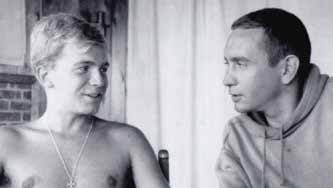 By Gary M. Kramer–
By Gary M. Kramer–
It’s time once again for the orgy of queer cinema that is Frameline! Running June 14–24, the festival offers viewers more than 100 shorts, features, and documentaries that are by, for and about LGBT filmmakers and subjects. Knowing what to watch can be overwhelming. Here are seventeen highlights from the first week of the festival.
A Moment in the Reeds (June 14, 10 pm, Castro; June 20, 6:30 pm, Victory) is a tender drama from Finland. Leevi (Janne Puustinen) reluctantly returns home to the family’s summer cottage his father, Jouko (Mika Melender), is renovating. Leevi, who is working on his literature thesis in Paris, is not very handy, so his father hires Tareq (Boodi Kabbani), a Syrian refugee to do the work. When Jouko is called away for business, Leevi and Tareq work and talk, and later take a sauna together. As the night evolves, long, hungry looks lead to passionate sex. The young men connect not just physically—stealing kisses from time to time—but emotionally as well, and viewers will share their intimacy. As the attractive leads discuss their families, the freedom they have being openly gay in a foreign land, Tareq’s tough journey as an immigrant, and being in love, A Moment in the Reeds is compelling. But does their relationship have a future? Or will it just be fleeting? Writer-director Mikko Makela’s leisurely-paced drama builds to a potent crescendo.

The BBC Masterpiece drama, The Man in the Orange Shirt (June 15, 9:15 pm, Castro), juxtaposes two parallel stories of gay love set sixty years apart. Sudsy in a good way, the first half of this miniseries features two soldiers, Michael (Oliver Jackson-Cohen), and Thomas (James McArdle), an artist, who share a passionate kiss during wartime. They meet up after the war ends and briefly share a comfy domesticity together at Michael’s country cottage where Thomas paints a portrait of Michael in an orange shirt. However, their idyllic arrangement ends when Michael marries Flora (Joanna Vanderham), and establishes himself in respectable society. Thomas is crushed and is later arrested for cottaging. How their relationship plays out is echoed in the second half of The Man in an Orange Shirt, as Michael’s grandson, Adam (Julian Morris), is living in London with Flora (Vanessa Redgrave). He works as a veterinarian, and discretely seeks hookups online. However, when he meets Steve (David Gyasi), an architect in an open relationship with Casper (Julian Sands), he finds himself falling in love. When Flora bequeaths Adam the family cottage, Adam asks Steve to help renovate it. Secrets and desires soon come out in the open. The Man in an Orange Shirt is handsomely mounted, and well-acted—by Redgrave, especially. The series bluntly makes its points about how homosexuality—and thoughts about it—have evolved in Britain over the decades. And despite some plot contrivances, there is a poignancy to the two queer relationships; viewers will want each to couple up to live happily and normally.

The Miseducation of Cameron Post (June 15, 9:30 pm, Roxie; June 21, Piedmont), is bisexual filmmaker Desiree Akhavan’s (Appropriate Behavior) bittersweet adaptation of Emily M. Danforth’s novel about forging one’s independence in the face of repression. Cameron (Chloë Grace Moretz) is a teenage lesbian who loves Coley (Quinn Shephard). When they are caught having sex, Cameron is sent to God’s Promise, a gay conversion therapy center. Of course, Cameron knows there is nothing wrong with her, and continues to have—and sometimes act on—her same-sex desires. It is only through the friendship of fellow “disciples,” Jane (Sasha Lane) and Adam (Forrest Goodluck), that she finds a way to maintain her authentic, true self. As Cameron measures herself against the other teens fighting for (or against) self-expression, she learns that weakness—she experiences a series of hardships—can provide strength. The Miseducation of Cameron Post is a somber drama, but Moretz gives a compelling performance and the film builds to a quietly powerful conclusion.

Bixa Travesty aka Tranny Fag, (June 15, 9:30 pm, Victoria; June 19, 7 pm, Rialto Cinemas Elmwood in Berkeley) is a bold documentary featuring the unabashed MC Linn da Quebrada, a transsexual performer, as well as her friends and family. The various concert scenes are fantastic, and da Quebrada’s charisma extends off-stage as well. She is seen co-hosting a radio show with fellow trans performer Jup de Bairro, and talking about her life with her mother, her hairdresser, and others. Bix Travesty often offers frank declarations, such as, “Before I was a fag now I’m a tranny,” and indelible images—watch da Quebrada paint her genitals with a tube of lipstick by inserting it into her foreskin—as well as a health issue, which is introduced late in the film. These moments add a layer of sadness to her life. da Quebrada may be a bit too in-your-face for some viewers, but this film captures her spirit vividly. When she plays a piano and a particular key doesn’t work, it is a potent symbol for a voice that might go silenced.
Sponsored by the San Francisco Bay Times, Michelle Memran’s fabulous documentary, The Rest I Make Up (June 16, 11 am, Victoria), is a sincere portrait of the “great unknown playwright” María Irene Fornés, who was part of the Off-Off-Broadway movement in the 1960s. A creative force of nature, Irene (as she is called) has won nine Obie awards for her plays, and gained the admiration of her peers, including Edward Albee and John Guare. She was also Susan Sontag’s lover. However, too few people know about her or her work. Memran’s film is not just a necessary corrective, but a portrait of the nearly forgotten artist at a time when the playwright herself is struggling with memory loss. Memran interviews a flirtatious Fornés—who delightfully asks as many questions as she answers—as well as fellow playwrights, and her family members. One of the most interesting sequences has Fornés returning to her homeland of Cuba (she left at age 15), to see her brother and his family for what may be the last time. And while there is a sadness in seeing Fornés’ memory decline, particularly in a revealing interview in Miami, The Rest I Make Up is as inspiring as its subject.
The Frameline screening of Paper Boys (June 16, 1:30 pm, Victoria) allows viewers to binge watch this entire webseries in one sitting. Cole (Kyle Cabral, who co-wrote and co-directed) moves to San Francisco to find work, and possibly to reconnect with his ex, Max (Henry Lee). He rooms with his straight friend Daren (Nathan Brown), who is engaged to Rebecca (Kai Lui). However, drama ensues when Daren tells Cole he wants to break things off with Rebecca. As the series unspools, it becomes apparent that Cole has a “superpower”—whatever image he draws, soon happens in real life. That ability has real consequences for Max, Daren, and Rebecca, as well as Cole. What transpires between the characters is best left for audiences to discover, but this bright, entertaining (and chaste) series is enlivened by its creator’s enthusiasm.
 The lovingly made documentary, Every Act of Life (June 16, 3:45 pm, Castro), is a profile of the esteemed out gay playwright, Terrence McNally. The film traces McNally’s life growing up in Corpus Christi, Texas, in the 1950s and his extraordinary success in the theater. McNally candidly discusses his failed relationships with the closeted playwright Edward Albee and actor Robert Drivas. He also discusses his drinking and how Angela Lansbury told him to stop. McNally even reveals his thoughts about his intensely vulnerable characters and his themes of invisibility and connection that were basis of his plays like Frankie and Johnny in the Clair de Lune, among others. Every Act of Life also highlights many of McNally’s gay productions, including The Ritz, Love! Valour! Compassion! and Mothers and Sons. If the film skimps on detailing the controversy surrounding McNally’s Corpus Christi, and rushes through McNally’s late career work, it nevertheless features fabulous photographs, letters, and archival footage. There are also wonderful interviews with a who’s who of theatre, including Nathan Lane, Audra McDonald, Tyne Daly, Billy Porter, John Glover, John Benjamin Hickey, and many more. It may seem like a hagiography, but as Every Act of Life proves, McNally deserves the genuflection.
The lovingly made documentary, Every Act of Life (June 16, 3:45 pm, Castro), is a profile of the esteemed out gay playwright, Terrence McNally. The film traces McNally’s life growing up in Corpus Christi, Texas, in the 1950s and his extraordinary success in the theater. McNally candidly discusses his failed relationships with the closeted playwright Edward Albee and actor Robert Drivas. He also discusses his drinking and how Angela Lansbury told him to stop. McNally even reveals his thoughts about his intensely vulnerable characters and his themes of invisibility and connection that were basis of his plays like Frankie and Johnny in the Clair de Lune, among others. Every Act of Life also highlights many of McNally’s gay productions, including The Ritz, Love! Valour! Compassion! and Mothers and Sons. If the film skimps on detailing the controversy surrounding McNally’s Corpus Christi, and rushes through McNally’s late career work, it nevertheless features fabulous photographs, letters, and archival footage. There are also wonderful interviews with a who’s who of theatre, including Nathan Lane, Audra McDonald, Tyne Daly, Billy Porter, John Glover, John Benjamin Hickey, and many more. It may seem like a hagiography, but as Every Act of Life proves, McNally deserves the genuflection.

Mario (June 16, 6:30 pm, Castro; June 23, 3:30 pm, Victoria) is a highly affecting drama from Switzerland about gay men in sports. Mario (an excellent Max Hubacher) is a soccer player who dreams of playing professionally. When another hotshot striker, Leon (Aaro Altaras), joins his team for the season, the two men soon find a rhythm on the pitch. When they are asked to share an apartment, the perfect couple on the field soon become a perfect couple off the field. Before long, Leon and Mario act on their mutual attraction. In bed, cuddling with Leon, Mario seems finally able to express himself and the same-sex desires he has been repressing for so long. The ripples of emotion in Mario’s body language speak volumes. However, a rumor about the gay teammates circulates, and in order to advance to the big league, the players must keep their sexuality secret. Mario thoughtfully shows how the lovers each deal with this imposed discretion and how the pressure affects their game and their lives—from teammates who tease and even blackmail them, to how Mario’s parents react to his sexuality. Should Mario and/or Leon give up what they love (soccer) for whom they love (each other)? The film’s canny second act shows the strategies both players use to answers that question. Mario may traverse familiar territory, but this absorbing film sneaks up on viewers and packs an emotional wallop.
Postcards from London (June 16, 9:30 pm, Castro; June 17, 9:30 pm, Elmwood) is writer/director Steve McLean’s witty and visually dynamic drama about Jim (Harris Dickinson), a young man from Essex who heads to London “in search of a world full of mystery and possibility.” What he finds, however, is a quartet of men called The Raconteurs—handsome rent boys who can talk about art and culture with their clients. As Jim reinvents himself as a Racounteur and artist’s muse, he displays his chiseled chest and his cultural learnings. He also suffers from “Stendahl Syndrome,” a condition that causes him to faint in front of paintings because of the strong emotions he feels. Postcards from London unfolds as a series of clever tableaus ranging from deliciously artificial neon-lit streets of Soho to recreations of Caravaggio paintings. The result may be an acquired taste, but Dickinson proves his breakout turn in last year’s Beach Rats was no fluke. Like a Raconteur, he reinvents himself here giving a marvelous performance that is at once innocent and knowing.
PJ Raval’s riveting documentary, Call Her Ganda (June 17, 1:30 pm, Castro), chronicles the 2014 death of Jennifer Laude, a trans Filipino woman who was killed/murdered by U.S. Marine Joseph Scott Pemberton. The film, which features gender-nonbinary journalist Meredith Talusan following the case, addresses issues of transphobia, U.S. colonialism, and justice—there are some interesting wrinkles— to show how Laude’s death exposed some painful truths about gender-based violence.

Close-Knit (June 17, 4 pm, Roxie) is an understated Japanese film about a young girl, Tomo (Rin Kakihara), who goes off to live with her uncle, Makio (Kenta Kiritani), when her mother temporarily abandons her. Makio tells Tomo that his girlfriend, Rinko (Tôma Ikuta), is “unusual;” she is, in fact, transgender. But the surrogate mother Rinko showers the lonely Tomo with affection and teaches her knitting as a way of coping with the anger she feels. Close-Knit is notable for its thoughtful depiction of transgender life in Japan. A flashback scene to Rinko as a young man wanting breasts—his mother knits him a pair—is very touching, as is a scene where Tomo visits Rinko in a hospital. The film also features an important subplot involving Kai (Kaito Komie), a gay classmate of Tomo’s, who is teased in school to underline its messages of tolerance and understanding. Tomo’s relationship with Rinko helps her to become closer to Kai. This is a lovely, heartfelt family drama.
Yen Tan’s 1985 (June 17, 6:45 pm, Castro) is a striking drama, artfully shot in black and white, and based in part on the director’s earlier short of the same name. Adrian (out actor Cory Michael Smith), a closeted gay man, returns home to Ft. Worth, and to his conservative parents Eileen (Virginia Madsen) and Dale (Michael Chiklis) as well as his younger brother Andrew (Aidan Langford). The atmosphere is quite claustrophobic, and Tan captures that in every pregnant pause. Adrian’s discomfort extends to keeping his HIV-positive status from his family and former best friend Carly (Jamie Chung). The stifling Bible-belt setting pretty much ensures the words “gay” and “AIDS” will not be mentioned, but they hang over the film like a shroud. Tan creates a series of delicate scenes as Adrian shares secrets and grapples with his conflicted emotions in individual exchanges with Andrew, Carly, Eileen and Dale. 1985 may moralize a bit, but the film is quite moving. Smith gives a strong, subtle performance, and Madsen is heartbreaking as his mom. Bring Kleenex.
The Gospel of Eureka, (June 17 at 9:45 pm, Castro) is Michael Palmieri and Donal Mosher’s revealing documentary—expanded from their 2016 short, Peace in the Valley—about Eureka Springs, Arkansas, population 2073. In this town, which is home to the largest statue of Jesus Christ in the U.S., the Great Passion Play, a dramatic reenactment of Christ’s last days, is performed regularly. But this town is also home to Live Underground—dubbed “a hillbilly Studio 54”—a popular bar where drag queens lip sync gospel songs. The film cross-cuts between performances in each venue to show that while the Christians and the gays may be very different, they really are more alike than they think. The Gospel of Eureka, which is narrated by Mx. Justin Vivian Bond, also presents the town’s battle over a local ordinance that would grant bathroom rights and other LGBT protections. The filmmakers introduce interesting folks, from Lee Keating and Walter Burrell, a gay Christian couple who own the Live Underground, to Jayme Brandt, a straight Christian shop owner whose father is gay, to Randall Christy, the CEO of the Great Passion Play, as well as various drag queens, a transwoman and even the actor who plays Jesus. Their stories show how the interviewees reconcile faith and sexuality (or don’t), and this provides the value of the film. The lessons of (in)tolerance illustrate the humanity of these people, and how they try to live side-by-side. The film includes several lyrical and powerful moments that indicate just how fragile that balance can be.
My Best Friend (June 19, 1:30 pm, Castro) is a slight and sentimental film from Argentina about Lorenzo (Angelo Mutti Spinetta), a sensitive teenager, whose parents Andrés (Guillermo Pfening) and Camila (Mariana Anghileri) take in Caíto (Lautaro Rodrígez), the troubled son of Andrés’ best friend. Lorenzo is enamored with this hunky new roommate, escorting him on adventures and caring for him so as not to lose him. The teens share secrets and confidences, but any sexual interest is expressed in Lorenzo silently admiring Caíto’s shirtless physique or giving him a kiss on the cheek during an overnight camping trip. My Best Friend deftly chronicles the unrequited love that develops between the boys, and the impact the relationship has on Lorenzo will speak to any viewer who has longed for their best friend.
Hard Paint (June 19, 9:15 pm, Castro) is an engrossing Brazilian drama set in Porto Alegre, about Pedro (Shico Menegat), a shy young man who is currently awaiting trial for a crime he committed. Pedro rarely ventures outside, spending most of his time indoors on his webcam. Using the name NeonBoy, he performs an act, which involves smearing paint on his naked body. It may seem like a gimmick, but another webcam boy, Leo (Bruno Fernandes), is mimicking Pedro. When Pedro meets the disarming Leo, they connect and start performing together. As they get to know one another—and have some very intense, very erotic sex—they start falling in love. Of course, complications ensue. Hard Paint features a minimal plot that allows viewers to get caught up in the intriguing relationship that develops between these two men, and the film’s melancholy tone echoes their romance. Menegat gives a terrific performance as the fragile Pedro. He conveys his palpable despair with his vivid body language. In support, the adorable Fernandes is infectious, injecting Pedro’s world—and the film—with brightness.
Just Friends (June 20, 9:15 pm Castro; June 24, 4 pm, Castro) is an undemanding rom-com made for Dutch TV. Two cute young men, Yad (Majd Mardo) and Joris (Josha Stradowski), meet cute when the former takes a job cleaning the latter’s grandmother’s (Jenny Arean) apartment. The sexual tension between the men is delicious, but families—Yad is Syrian, Joris’ is dysfunctional—get in the way, as does an encounter with homophobes. However, Just Friends balances humor and heart as it makes its points about love, mothers and the difference between being friends and being boyfriends. Mardo exhibits comic verve while the sexy Stradowski provides viewers with plenty of eye candy.
Snapshots (June 20, 9:30 pm, Elmwood; June 21, 6:30 pm, Victoria) is a cozy family drama about Rose (the superb Piper Laurie) spending the weekend at her cabin with her adopted daughter Patty (Brooke Adams) and granddaughter Allison (Emily Baldoni). Allison, a photographer, returns a camera to Rose along with prints from a roll of film. The snapshots trigger Rose to remember her life in the cabin back in the early 1960s, when she was married to Joe (Max Adler) and friendly with Louise (Emily Goss) and Zee (Brett Dier). A brassy young woman, Louise flirts with Rose (Shannon Collis), eventually seducing her. Director Melanie Mayron toggles back and forth between intimate episodes from Rose’s past and the present-day struggles of involving Allison, who is unexpectedly pregnant and having marital troubles. The juxtaposition of Rose’s furtive romance with the family revelations provides plenty of drama, but it is the platitudes about living life on one’s own terms that truly resonate.
© 2018 Gary M. Kramer
Gary M. Kramer is the author of “Independent Queer Cinema: Reviews and Interviews,” and the co-editor of “Directory of World Cinema: Argentina.” Follow him on Twitter @garymkramer
Recent Comments